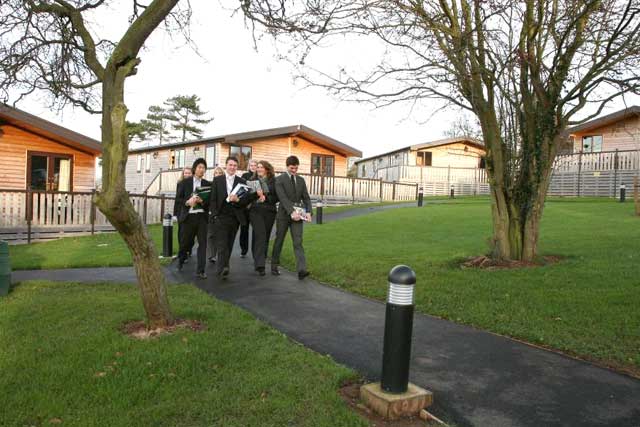Life lessons are just as important as academic ones at Abbotsholme School

The transition from school to university is a big step in any young person's life. Having been guided by the reassuring rules and routines of home and school, suddenly you are master of your own time. Whether it's knowing how to cook an egg, get a sensible amount of sleep or organise a study schedule, adapting to university life can be challenging.
So what's the best way to cope with this transition? It could be taking a year out, which might include opportunities to fend for oneself. Or it might be to attend a school such as Abbotsholme, in Staffordshire, which offers sixth-form pupils a taste of independence before they depart for university.
The school does this by housing sixth-form students in log cabins in the grounds of its 140-acre country estate. Instead of being forced to live in four- or six-bedded dorms, supervised by a houseparent, which can often be the norm, pupils at Abbotsholme have the option of living in small purpose-built cabins, each housing six. (Those pupils who don't fancy cabin living can stay in a traditional-style boarding house.)
Each cabin has a large open-plan living area with a television and a DVD player, a kitchen, two bathrooms and three twin-bedded bedrooms. Pupils can buy and cook their own meals if they choose, do their own washing and ironing, and, above all, learn to rub along with five other human beings.
A houseparent lives in their own cabin nearby, hands-off, but there as and when needed.
"We believe that life skills are just as important as academic ones," says the headmaster, Steve Fairclough. "Captains of industry keep saying this is what they need – it's no good producing students who don't know how to boil an egg. We take a more holistic view of education. It's not just about getting good grades, it's about educating people for life."
Fairclough got the idea for the cabins after volunteering abroad for Bunac as a school-leaver. "If I'd had the experience of living in the cabins, I'd have got far more out of it and coped much better," he says.
"When I got to Abbotsholme, the boarding side was growing and we needed more bed spaces. We had the choice of building a traditional boarding house, or doing something really special, which is what we did. The cabins have been very popular: they're always full."
Fairclough believes that the lessons learnt in the cabins are just as important as those that are learnt in the classroom. "Pupils learn how to get along with others and how to handle their idiosyncrasies," he says.
"Life's not always easy in the cabins. There's nowhere to hide. They do fall out when the washing up isn't done or when people haven't cleared up after cooking. But each cabin finds its way of doing things.
"At the end of it, the students come out more confident and better prepared for life. They understand values like respect, courage and humility. Most of our pupils choose to live in houses rather than halls of residence when they get to university. They tend to be very independent and work hard, and don't waste time doing stupid things that many of their fellow students do."
Charlotte Hudson, 21, lived in a cabin while in the sixth form at Abbotsholme before studying for a degree in sports science at Bangor University, which she recently finished. She says: "When I got to university, I was already used to living with people of my own age, but some of the other students found it really hard to adjust.
"They didn't know how to do basic things like switching on a washing machine or cooking pasta. I met some guys who didn't even know how to use a can opener, so had to buy the cans that don't need an opener."
Having lived away from home and mucked in with others of her own age, university was less of a challenge than for those who had lived at home or gone to traditional boarding schools, says Hudson. "As I'd lived in the cabins, I was used to looking after my own space and rubbing along with others."
So, will other schools emulate the example of Abbotsholme? "We've had a number of schools who have come to have a look, but as far as I know no one has adopted our exact model," says Fairclough. "It's not an add-on, it has to be part of a school's ethos of education for life."
Join our commenting forum
Join thought-provoking conversations, follow other Independent readers and see their replies
Comments
Bookmark popover
Removed from bookmarks